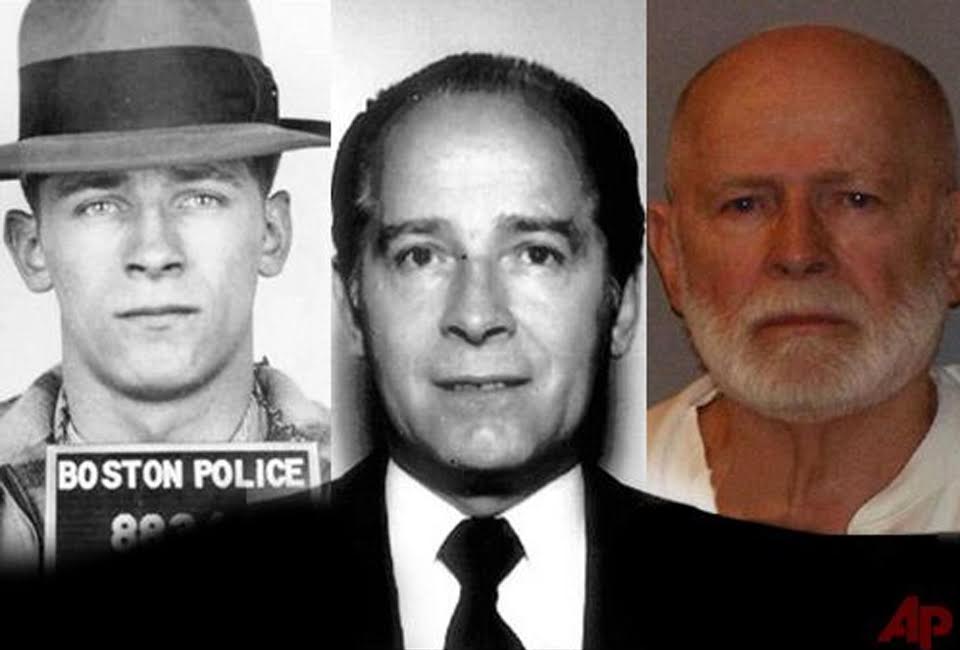
“Whitey: United States of America v. James J. Bulger” is a documentary about the 2013 trial of Jim “Whitey” Bulger, the boss of the Winter Hill Gang, an Irish-American crime family in Boston.
Whitey reigned for 25 years while law enforcement looked the other way. He was finally arrested in 2011 and charged with 19 murders and 32 counts of racketeering, money laundering, weapons and extortion.
Whitey was 81 and living with his longtime girlfriend Catherine Grieg at the time of his arrest. They were hiding in plain sight in their Santa Monica apartment complex. Bulger had been No. 2 on America’s Most Wanted fugitives list for years, second only to Osama bin Laden. Either the FBI is dumber than a tree stump, or it wasn’t looking very hard.
The FBI claims Bulger was an informant since 1975. He was protected from punishment for his illegal activities in exchange for information about the Italian Patriarca crime family. In 1994, corrupt FBI Special Agent John Connelly tipped Bulger off to a pending indictment, so Bulger and Grieg fled.
The new film “Whitey: United States of America v. James J. Bulger” is by Academy- and Emmy Award-nominated filmmaker Joe Berlinger, who refers to himself as a crime aficionado driven to expose corruption. I interviewed Berlinger along with Bulger’s defense attorney, Hank Brennan.
Sounding like a line from “The Godfather” Brennan said, “When I first met Bulger, he looked at my shoes and asked if I shine them every day. I looked at my shoes with pride because I do shine them every day. Bulger said, ‘The older generation, we look at shoes. That shows respect. But you shine with a brush, don’t you? You can see the lines. You need to get a hotel shiner.’ So I went out and bought a hotel shiner. He talked about the way I tie my ties and the coordination of colors and he said, ‘Don’t call yourself Hank at trial, that’s a little kid’s name. Say Brennan — like Bond or Bulger.’”
When I asked the handsome Brennan what working on a case like this does to your social life he said, “What social life?” and we both laughed.
JOE BERLINGER
Dorri Olds: What inspired this film?
I have long been fascinated by the Whitey Bulger story and how this guy had been mythologized. There are a dozen books, Johnny Depp is shooting a movie, Ben Affleck and Matt Damon are doing a movie, and “The Departed” was based on Bulger. I never thought I’d have anything to add about this guy who was on top of the Boston underworld for 25 years. But, when he was arrested and a new generation of FBI came in and I heard there was going to be a trial, that’s when I thought there’s a film here.
Whitey was brought back to Massachusetts in the biggest legal proceeding since the 1920 Sacco and Vanzetti trials. My guiding principle going into the film was thinking we’d get to know how the government made Bulger possible. But it became clear that this long-awaited trial that the victims’ families deserved was going to be a narrowly focused trial.
What do you mean?
Bulger wasn’t even contesting a number of the charges, and he’s going to spend the rest of his life in prison, as he should. The opportunity here was to understand the institutional corruption that allowed this guy to reign. That didn’t happen. When Judge [Denise] Casper disallowed Bulger from presenting his immunity claim and struck witnesses the defense wanted to present, it became clear my mission for this film was to raise a lot of questions.
Did you get the answers?
Unfortunately, no. At the end of the trial, District Attorney of Massachusetts Carmen Ortiz stands before the press and says, “With the conviction of James Bulger this ugly chapter in Boston’s history is now over.” Well, is it over? We still don’t know what happened, and too many troubling questions remain. If Whitey was really an informant — the central question of the film — then the government was in the business of picking and choosing who can live or die by saying, “OK, we’re going after the Italian Mafia, so we’re going to let these Irish criminals run roughshod over the city of Boston with impunity.”
Are you sympathetic to the defense?
I’m no defender of Whitey Bulger. He’s a brutal, vicious killer that deserves to be behind bars, but I’m an advocate of the truth. Whitey was shut down from presenting arguments for what allowed him to operate. And now, with so many viewpoints, it’s the Rashoman experience, the unknowability of the truth.
How surreal was it when Stephen Rakes, one of the key witnesses, was murdered?
I have no reason to believe it wasn’t just a bad business deal with a guy who didn’t want to pay his debt so he poisoned Stephen Rakes. But the significance was when Stephen Rakes’ death was announced, the observers, victims’ family members and everyone in that courtroom debated with equal voracity the possibility that the government was involved in the killing. Their faith was so eroded they actually debated that the government knocked off one of the witnesses.
HANK BRENNAN
I have to agree with Joe. The victims’ families thought it was equally likely that the federal government was involved in Rakes’ death as the probability that it was the murderer sitting next to me. That shows the shaken faith in the government. It was offensive that Stephen Rakes, a named victim in the case, was not entitled to testify against Bulger. Especially when the government was saying, “We want a conviction against somebody.” The government would not allow Rakes to testify after he’d waited for 20 years because his testimony would contradict directly Kevin Weeks, one of the precious witnesses for the government. It showed they had no confidence in their storyline when a Bulger victim would get up and contradict their player. That is not a search for the truth. That is a choreographed story they’re trying to preserve.
Were there parts in the trial where you were shot down due to legalities?
I don’t know if it was legalities or a cover-up but there was a battle from before the trial when we wanted the truth to come out in this case. Typically as a defense attorney you don’t always seek evidence for the truth. We were in a unique position because Jim Bulger was already going to spend the rest of his life in jail. Bulger took responsibility for everything he did. He sat up and testified to it and had no shame in doing that, but the government should’ve been held accountable as well. The government botched the case when they said “get him, but don’t talk about us.” That was not a search for the truth, and it was a disservice to the public.
Was the government’s motivation fear that its past Mafia convictions would get overturned?
It’s not so much that their cases would get overturned. The government had been involved in a systemic corruption for decades with these informant programs and the way they do business. For them to pay witnesses — murderers — millions of dollars but not champion the victims’ families and then come into court and say, “Let’s just come to court and create a myth, we’ll blame it on one person as a diversion from us and everything we’ve done.” That just didn’t sit well with us. Whitey had nothing to lose; he will be in jail the rest of his life, and he’s 84, so this was a perfect opportunity for him to say to the officials, “Why don’t you just tell them what you did?”
How did it feel when the son of a victim said, “We learned more from the defense team than from the prosecutors?”
It angers me. We’d ask questions, and the family would be within feet of me. At the beginning of the trial, before I knew them, I’d hear them cheering during cross examination and encouraging me. The widows and children of victims would walk by my car in the morning and give me a hug. That’s outrageous. I was the attorney representing the killer of their loved ones.
“Whitey: United States of America v. James J. Bulger” opened in theaters June 27 and is available on On Demand and iTunes.
Crime documentary. Rated R. 120 min.
Watch the trailer:
Dorri Olds is a contributing journalist for TheBlot Magazine.





